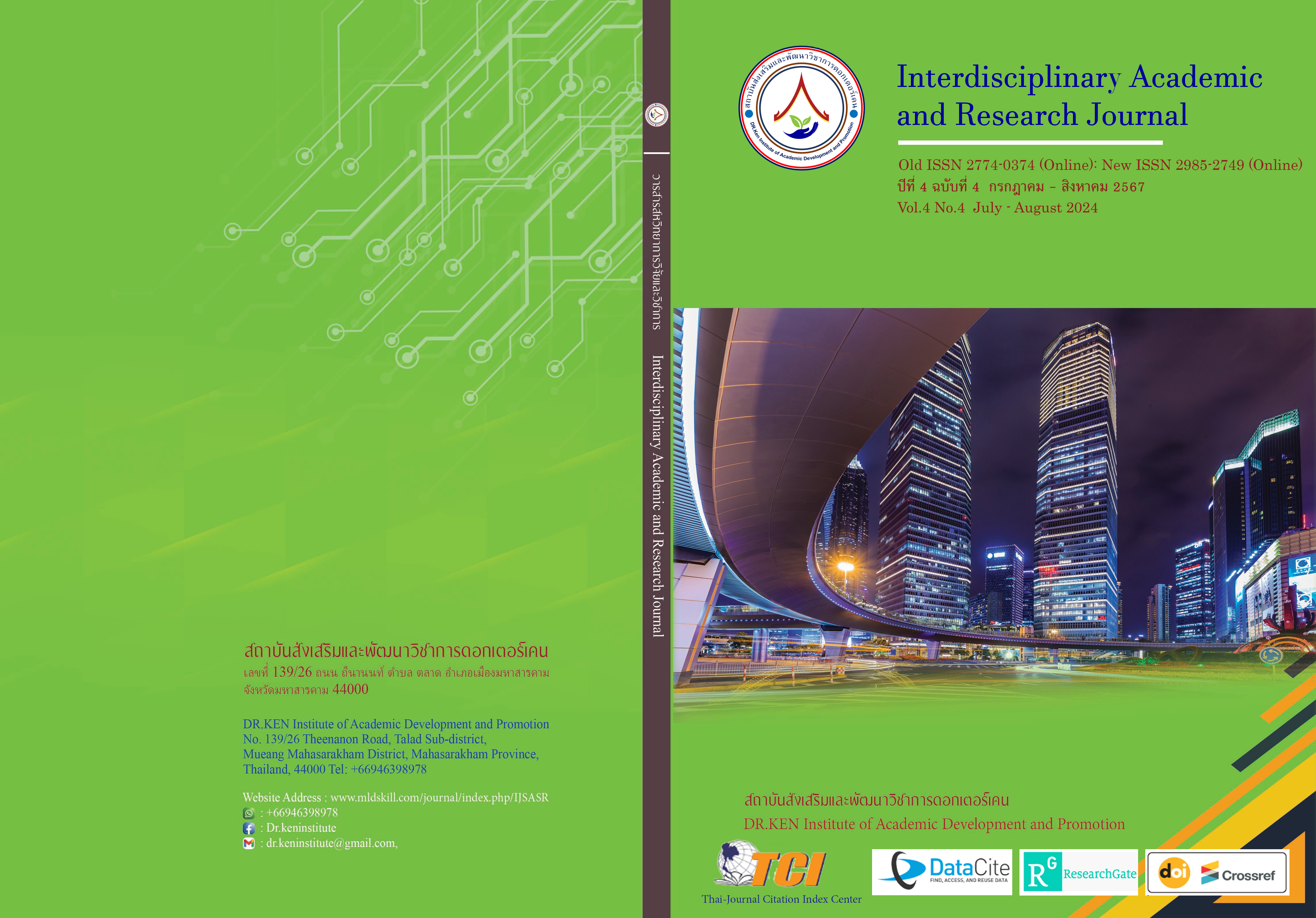A Construction of a Research Skills Test for Upper Secondary School Students
DOI:
https://doi.org/10.60027/iarj.2024.277004Keywords:
Research Skills; , Skills Test; , Cutting-Off ScoresAbstract
Background and Aims: Research skills play an important role in demonstrating abilities and behaviors as regards conducting a research study as well as the use of appropriate research processes. They also possess the ability to research and seek answers to questions to create new knowledge. Should students at the basic education level be encouraged to develop research skills, this could yield effective results for their further education levels. However, the existing problem related to studies of research skills in the secondary school context seems to be a dearth of research skills test designs specific to upper-secondary school students. The primary objectives of this study are (1) to construct a research skills test for upper-secondary school students and (2) to determine the cutting-off scores used in the interpretation of the constructed test.
Methodology: The sample population consisted of 716 upper secondary school students under the Secondary Educational Service Area Office, Nonthaburi, using a multi-stage sampling technique. Descriptive statistics were employed in the data analysis.
Results: 1) The research skills test exhibited the content validity at 0.67-1.00, the reliability at .96, the difficulty at .88-.98, and the discrimination at .28-.58. And, 2) the determination of the cutting-off scores for the consideration of the results of the research skills test was at 80 percent. The consideration was divided into two levels as follows: 2.1) Level One: the students having passed the cutting-off scores, accounting for 90.50 percent, and 2.2) Level Two: the consideration of each research skill. The results showed that the research skills of which the students had the highest scores were (1) formulating a research topic and (8) writing research reports and presenting research results. The number of students who passed the cutting-off scores of the two skills was 90.22 percent. Regarding (9) the dissemination of research and the use of research results, there was the lowest number of students who passed the cutting-off scores of this skill when compared to other skills i.e., 85.57 percent.
Conclusion: The results confirmed the quality of the constructed test and its applicability as a central tool to measure the students’ research skills to elicit the scores reflecting their current research skills. Additionally, the scores from the constructed test can be used for further investigation to help promote, expand, and develop students’ research skills.
References
กนกอร พันธุ์ไพโรจน์. (2559). การศึกษาทักษะการวิจัยของนักเรียนชั้นมัธยมศึกษาปีที่ 5 ที่ได้รับการจัดการเรียนรู้แบบวิจัยเป็นฐาน เรื่อง วิธีการพิสูจน์เบื้องต้น. วิทยานิพนธ์วิทยาศาสตรมหาบัณฑิต มหาวิทยาลัยอุบลราชธานี.
กระทรวงศึกษาธิการ. (2551). หลักสูตรแกนกลางการศึกษาขั้นพื้นฐาน พุทธศักราช 2551. โรงพิมพ์ชุมนุมสหกรณ์การเกษตรแห่งประเทศไทย.
กุลชาติ พันธุวรกุล และ เมษา นวลศรี. (2564). ความต้องการจำเป็นในการพัฒนาสมรรถนะด้านการวิจัยในชั้นเรียนของครูปฐมวัยสังกัดองค์กรปกครองส่วนท้องถิ่นจังหวัดปทุมธานี. วารสารวไลยอลงกรณ์ปริทัศน์, 11(3), 1-17.
ดนิตา ดวงวิไล. (2564). การจัดการเรียนรู้รายวิชาการผลิตสื่อการสอนวิชาภาษาไทยโดยใช้การวิจัยเป็นฐานที่มีต่อผลสัมฤทธิ์ทางการเรียนและทักษะการวิจัยของนิสิตระดับปริญญาตรีสาขาวิชาภาษาไทย. วารสารมนุษยศาสตร์และสังคมศาสตร์มหาวิทยาลัยนครพนม, 11(2), 272-286.
ดวงพร เขียวพระอินทร์. (2560). การพัฒนาผลสัมฤทธิ์ทางการเรียนรายวิชาชีววิทยาและทักษะการวิจัยของนักเรียนชั้นมัธยมศึกษาปีที่ 4 ที่จัดการเรียนรู้โดยใช้การวิจัยเป็นฐานร่วมกับแนวคิดการกลับด้านชั้นเรียน.วารสารอิเล็กทรอนิกส์ Veridian มหาวิทยาลัยศิลปากร, 10(2), 392-408.
ทิพย์สิริ กาญจนวาสี และ ศิริชัย กาญจนวาสี. (2564). วิธีวิทยาการวิจัย. พิมพ์ครั้งที่ 4. สำนักพิมพ์ทันใจ.
พวงผกา ปวีณบำเพ็ญ. (2560). การจัดการเรียนรู้โดยใช้วิจัยเป็นฐาน. ศึกษาศาสตร์สาร มหาวิทยาลัยเชียงใหม่, 1(2), 62-71.
พิชิต ฤทธิ์จรูญ. (2556). หลักการวัดและประเมินผลการศึกษา. พิมพ์ครั้งที่ 8. บริษัท เฮ้าส์ ออฟ เคอร์มิสท์ จำกัด.
พิมพ์ปวีณ์ สุวรรณโณ , พิมลพรรณ ลีลาภัทรพันธุ์, อรวรรณ กมล. (2564). การวิจัยประเมินความต้องการจำเป็นด้านสมรรถนะการวิจัยเชิงพื้นที่ของนักศึกษาวิชาชีพครู มหาวิทยาลัยราชภัฏยะลา.วารสารมหาวิทยาลัยราชภัฏยะลา.16 (3), 367-375.
พิมพ์ปวีณ์ สุวรรณโณ และ ศุภลักษณ์ สินธนา. (2561). การศึกษาผลสัมฤทธิ์ทางการเรียนและทักษะการวิจัยของนักศึกษาชั้นปีที่ 4 มหาวิทยาลัยราชภัฏยะลาที่เรียนด้วยการจัดการเรียนการสอนโดยใช้การวิจัยเป็นฐาน. วารสารมหาวิทยาลัยราชภัฏยะลา, 13(1), 162-170.
รุจิราพร รามศิริ. (2556). การพัฒนารูปแบบการเรียนการสอนวิทยาศาสตร์โดยใช้การวิจัยเป็นฐานเพื่อเสริมสร้างทักษะการวิจัย ทักษะการแก้ปัญหาอย่างสร้างสรรค์และจิตวิทยาศาสตร์ของนักเรียนระดับชั้นมัธยมศึกษา. ดุษฎีนิพนธ์ปรัชญาดุษฎีบัณฑิต: มหาวิทยาลัยศิลปากร.
โรซวรรณา เซพโฆลาม, รูฮัยซา ดือราแม และ โซฟีลาน มะดาแฮ. (2565). สมรรถนะการวิจัยในชั้นเรียนของนักศึกษาครู เพื่อพัฒนาท้องถิ่น. วารสารสังคมศาสตร์และมานุษยวิทยาเชิงพุทธ, 7(2), 275-293.
ล้วน สายยศ และอังคณา สายยศ. (2543). เทคนิคทางการวัดผลการเรียนรู้. พิมพ์ครั้งที่ 2. สุวีริยาสาส์น.
ศิริชัย กาญจนวาสี. (2556). ทฤษฎีการทดสอบแบบดั้งเดิม. พิมพ์ครั้งที่ 7. โรงพิมพ์แห่งจุฬาลงกรณ์มหาวิทยาลัย.
สัญญา เคณาภูมิ. (2564). แนวทางและเทคนิคการเขียนผลงานวิชาการ. โรงพิมพ์แห่งจุฬาลงกรณ์มหาวิทยาลัย.
สำนักบริหารงานการมัธยมศึกษาตอนปลาย. (2565). แนวทางการจัดการเรียนการสอนในโรงเรียนมาตรฐานสากล (ฉบับปรับปรุง). ไอเดีย แอนด์ พริ้นติ้ง.
สินธะวา คามดิษฐ์. (2557). การจัดการเรียนการสอนโดยใช้กระบวนการวิจัยในระดับอุดมศึกษา. วารสารสุทธิปริทัศน์, 28(85). 9-21.
สิริวรรณ สิรวณิชย์. (2557). การพัฒนาทักษะวิจัยของนักศึกษาโดยบูรณาการกับประวัติศาสตร์ท้องถิ่นจังหวัดกำแพงเพชร. วารสารพิกุล, 12(1). 27-48.
สุวิมล ติรกานันท์. (2553). การวิเคราะห์ตัวแปรพหุในงานวิจัยทางสังคมศาสตร์. พิมพ์ครั้งที่ 2. สำนักพิมพ์แห่งจุฬาลงกรณ์มหาวิทยาลัย.
อังคณา กุลนภาดล. (2559). การวิจัยทางการศึกษา. พิมพ์ครั้งที่ 2. บริษัททริปเพิ้ล เอ็ดดูเคชั่น จำกัด.
อิทธิพัทธ์ สุวทันพรกูล. (2561). การวิจัยทางการศึกษา: แนวคิดและการประยุกต์ใช้. สำนักพิมพ์แห่งจุฬาลงกรณ์มหาวิทยาลัย.
Ain, C.T., Sabir, F., & Willison, J. (2019). Research skills that men and women developed at university and then used in workplaces. Studies in Higher Education, 44(12), 2346-2358.
Lander, J., Seeho, S., & Foster, K. (2019). Learning practical research skills using an academic paper framework–an innovative, integrated approach. Health Professions Education, 5(2), 136-145.
Maddens, L., Depaepe, F., Janssen, R., Raes, A., & Elen, J. (2020). Evaluating the Leuven research skills test for 11th and 12th grade. Journal of Psychoeducational Assessment, 38(4), 445-459.
Mahasneh, O.M. (2020). The effectiveness of flipped learning strategy in the development of scientific research skills in procedural research courses among higher education diploma students. Research in Learning Technology, 28, 1-17
Polat, B., & Kutlu, O. (2022). Investigation of the effectiveness of the research skills teaching program. International Journal of Assessment Tools in Education, 9(1), 39-60.
Rodríguez, G., Pérez, N., Núñez, G., Baños, J.E., & Carrió, M. (2019). Developing creative and research skills through an open and interprofessional inquiry-based learning course. BMC Medical Education, 19(1), 1-13.
Salybekova, N., Issayev, G., Abdrassulova, Z., Bostanova, A., Dairabaev, R., & Erdenov, M. (2021). Pupils’ research skills development through project-based learning in biology. Cypriot Journal of Educational Sciences, 16(3), 1106-1121.
Downloads
Published
How to Cite
Issue
Section
License
Copyright (c) 2024 Interdisciplinary Academic and Research Journal

This work is licensed under a Creative Commons Attribution-NonCommercial-NoDerivatives 4.0 International License.
Copyright on any article in the Interdisciplinary Academic and Research Journal is retained by the author(s) under the under the Creative Commons Attribution-NonCommercial-NoDerivatives 4.0 International License. Permission to use text, content, images, etc. of publication. Any user to read, download, copy, distribute, print, search, or link to the full texts of articles, crawl them for indexing, pass them as data to software, or use them for any other lawful purpose. But do not use it for commercial use or with the intent to benefit any business.
















.png)


